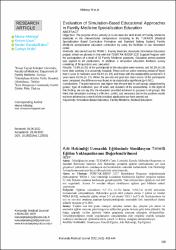| dc.contributor.author | Altıntop, Merve | |
| dc.contributor.author | Uzun, Kerem | |
| dc.contributor.author | Karakullukcu, Serdar | |
| dc.contributor.author | Ardıç, Cüneyt | |
| dc.date.accessioned | 2022-11-30T07:07:44Z | |
| dc.date.available | 2022-11-30T07:07:44Z | |
| dc.date.issued | 2022 | en_US |
| dc.identifier.citation | Altintop, M., Uzun, K., Karakullukcu, S. & Ardic, C. (2022). Evaluation of Simulation-Based Educational Approaches in Family Medicine Specialization Education. Konuralp Tıp Dergisi, 14(3), 438-444. https://doi.org/10.18521/ktd.1128251 | en_US |
| dc.identifier.issn | 1309-3878 | |
| dc.identifier.uri | https://doi.org/10.18521/ktd.1128251 | |
| dc.identifier.uri | https://hdl.handle.net/11436/7193 | |
| dc.description.abstract | Objective: The purpose of our activity is to increase the skill levels of Family Medicine assistants in the interventional competencies including in the TUKMOS (Medical Specialization Board Curriculum Formation and Standard Setting System) Family Medicine specialization education curriculum by using the facilities in our simulation center. Methods: We carried out the 'RSIM 1. Family Medicine Assistants Simulation Education project, which we planned in line with the TUBITAK-BIDEP 2237 Support Program with the participation of a total of 32 Family Medicine assistants. Education pretest-posttest was applied to all participants. In addition, a simulation education feedback survey consisting of 34 questions was conducted. Results: 71.9% (n:23) of the participants in the education were women, and 56.2% (n:18) have been working in a university hospital. Those with an active working period of fewer than 2 years in medicine were 59.4% (n: 19), and those with the assistantship period of 2-3 years were 53.1% (n: 17). When the pre-test and post-test mean scores of the participants were compared, the difference was found to be statistically significant (p<0.001). Conclusions: The post-test score was higher than the pre-test in each group categorized by gender, type of institution, year of work, and duration of the assistantship. In the light of this finding, we can say that the education provided achieved its purpose in all groups. We think that simulation training is effective, useful, and necessary due to the positive results we have achieved as a result of the practical application we have carried out. | en_US |
| dc.language.iso | ara | en_US |
| dc.publisher | Düzce University | en_US |
| dc.rights | info:eu-repo/semantics/openAccess | en_US |
| dc.subject | Simulation-based education | en_US |
| dc.subject | Family medicine | en_US |
| dc.subject | Medical education | en_US |
| dc.title | Evaluation of simulation-based educational approaches in family medicine specialization education | en_US |
| dc.title.alternative | Aile hekimliği uzmanlık eğitiminde simülasyon temelli eğitim yaklaşımlarının değerlendirilmesi | en_US |
| dc.type | article | en_US |
| dc.contributor.department | RTEÜ, Tıp Fakültesi, Dahili Tıp Bilimleri Bölümü | en_US |
| dc.contributor.institutionauthor | Altıntop, Merve | |
| dc.contributor.institutionauthor | Ardıç, Cüneyt | |
| dc.identifier.doi | 10.18521/ktd.1128251 | en_US |
| dc.identifier.volume | 14 | en_US |
| dc.identifier.issue | 3 | en_US |
| dc.identifier.startpage | 438 | en_US |
| dc.identifier.endpage | 444 | en_US |
| dc.relation.journal | Konuralp Tıp Dergisi | en_US |
| dc.relation.publicationcategory | Makale - Ulusal Hakemli Dergi - Kurum Öğretim Elemanı | en_US |


















